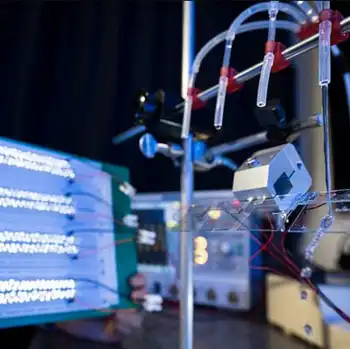House passes funding for green vehicle research
By Associated Press
CSA Z463 Electrical Maintenance -
Our customized live online or in‑person group training can be delivered to your staff at your location.

- Live Online
- 6 hours Instructor-led
- Group Training Available
The House plan would allow the Energy Department to spend up to $200 million more each year on research and development for advanced-technology vehicles and auto parts. Lawmakers' aides said the additional $200 million would boost government-supported research in this area to around $550 million if Congress, as expected, funds the request later this year.
The measure passed on a 312-114 vote, attracting dozens of Republican votes, even though some GOP lawmakers questioned its cost.
The House action represented the latest move by Congress and the Obama administration to aid the auto industry. The White House stepped in with billions of dollars to rescue General Motors and Chrysler and led the companies through bankruptcy, and Congress approved $25 billion last year to help the industry retool assembly plants to meet tougher fuel economy standards.
Congress also created a $3 billion Cash for Clunkers program of incentives that successfully spurred new car sales over the summer.
Fuel-efficient technology is in great demand because of higher gasoline prices and the expectation of tightening auto regulations. Administration officials released plans to raise the gas mileage standards to 35.5 miles per gallon by 2016 and link greenhouse gas emissions and fuel economy requirements.
Rep. Gary Peters, D-Mich., who sponsored the green vehicle technology bill, said "there is no doubt that in the years ahead more Americans will be driving hybrids, plug-in hybrids, battery electric vehicles, and cars and trucks powered by hydrogen fuel cells."
"The only question is whether these new technologies will be researched, developed and manufactured here in the United States, creating American jobs, or whether this technology will be built overseas," Peters said.
The plan's cost concerned some Republicans. Rep. Paul Broun, R-Ga., wanted to freeze the potential funding amounts through 2013 and cut funding in 2014 but his plan was defeated. Broun noted that Congress was already spending billions of dollars to help the auto industry.
"Simply throwing money at a problem is never a solution," Broun said.
The bill would authorize $2.9 billion to the Energy Department to boost the research over five years. It would push the government to team up with companies and universities to conduct research on technologies such as batteries for hybrid vehicles, electric cars, hydrogen fuel cells and infrastructure for the electric grid.
The legislation also would create a research program for advanced technologies for medium- to heavy-duty commercial trucks and transit vehicles, while specifying that the government should partner with a diverse group of companies, non-governmental organizations and academic groups, including those which have not previously worked on government-sponsored research and development.
The Energy Department in June announced it would lend $5.9 billion to Ford Motor Co. and about $2.1 billion to Nissan Motor Co. and Tesla Motors Inc. to upgrade facilities to build fuel-efficient vehicles. Battery manufacturers were awarded $2.4 billion in federal grants in August to develop electric vehicles and batteries. Other auto suppliers have been seeking similar partnerships with the government.
Bob McKenna, president and CEO of the Motor & Equipment Manufacturers Association, wrote in a letter to lawmakers that the legislation "will allow motor vehicle suppliers to make the highly efficient components and technologies that will be necessary for future cutting-edge vehicles."











